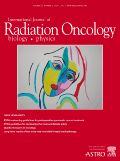
INTERNATIONAL JOURNAL OF RADIATION ONCOLOGY BIOLOGY PHYSICS
Scope & Guideline
Advancing the Frontiers of Radiation Oncology.
Introduction
Aims and Scopes
- Clinical Outcomes in Radiation Therapy:
Research examining the efficacy and safety of various radiation therapy modalities, including comparisons of treatment techniques, dosimetric analyses, and long-term patient outcomes. - Radiobiology and Mechanisms of Action:
Studies investigating the cellular and molecular mechanisms underlying radiation effects on cancer cells, including radiosensitivity, tumor microenvironment interactions, and immune responses. - Technological Advances in Radiation Treatment:
Innovations in radiation therapy technologies, such as intensity-modulated radiation therapy (IMRT), proton therapy, and stereotactic body radiation therapy (SBRT), and their implementation in clinical practice. - Quality Assurance and Treatment Planning:
Research focused on improving treatment planning processes, quality assurance measures, and the use of artificial intelligence in enhancing the accuracy and efficiency of radiation therapy. - Healthcare Disparities and Access to Care:
Investigations into disparities in treatment access and outcomes among diverse patient populations, with a focus on improving equity in radiation oncology. - Patient-Centered Care and Quality of Life:
Research examining the impact of radiation therapy on patients' quality of life, including symptom management, psychosocial factors, and patient-reported outcomes.
Trending and Emerging
- Artificial Intelligence and Machine Learning:
The integration of AI and machine learning in radiation oncology is increasingly prevalent, focusing on automating treatment planning, improving segmentation accuracy, and predicting treatment outcomes. - Personalized Radiation Therapy:
There is a growing emphasis on tailoring radiation therapy based on individual patient characteristics, including genomic profiles, tumor biology, and treatment response, to optimize outcomes. - Immunotherapy Combinations:
Research exploring the synergistic effects of combining radiation therapy with immunotherapy is trending, as this approach aims to enhance antitumor responses and improve patient prognosis. - Health Equity and Access to Care:
An increasing focus on addressing disparities in access to radiation therapy and understanding the social determinants of health affecting treatment outcomes for underrepresented populations. - Quality of Life and Patient-Reported Outcomes:
Emerging studies are prioritizing the assessment of quality of life and patient-reported outcomes following radiation therapy, highlighting the importance of holistic patient care.
Declining or Waning
- Traditional Radiation Techniques:
Research on conventional radiation therapy techniques has decreased as interest shifts toward innovative methods such as proton therapy and SBRT, which offer improved outcomes and reduced side effects. - Basic Radiobiology Studies:
There has been a noticeable decline in basic radiobiology studies focusing solely on cellular responses to radiation, as the field increasingly emphasizes clinical applications and translational research. - Single-Institution Studies:
The prevalence of single-institution studies has waned in favor of multi-institutional collaborations and large-scale trials, which provide more generalizable and robust data.
Similar Journals
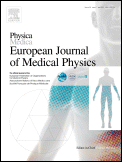
Physica Medica-European Journal of Medical Physics
Elevating Standards in Radiology and BiochemistryPhysica Medica - European Journal of Medical Physics is a premier peer-reviewed journal published by ELSEVIER SCI LTD, dedicated to advancing the field of medical physics. Established in 1989 and serving as a critical platform for innovative research, this journal covers a broad spectrum of topics within biophysics, radiology, and imaging sciences, consistently ranked in the Q1 category across these disciplines. With an impressive impact factor that highlights its influence within the scientific community—ranking 52/333 in Radiology, 42/243 in Physics and Astronomy, and 35/152 in Biochemistry—the journal is a valuable resource for professionals, researchers, and students aiming to contribute to the technological and methodological advancements in medical physics. Physica Medica is committed to fostering open dialogue and collaboration within the global medical physics community, although it currently does not offer open access options. The journal's extensive citation history and ongoing relevance underscore its importance in the continuous evolution of medical science.

Current Breast Cancer Reports
Elevating Research, Transforming Lives.Current Breast Cancer Reports is a vital academic journal published by Springer that focuses on the latest research and advancements in the field of breast cancer. With its ISSN 1943-4588 and E-ISSN 1943-4596, this journal serves as an essential resource for oncologists, researchers, and healthcare professionals dedicated to improving diagnosis and treatment strategies for breast cancer. Spanning from 2009 to 2024, it provides a platform for high-quality, peer-reviewed articles that encompass a range of topics, including molecular biology, clinical trials, and innovative therapeutic approaches. Although it is currently classified in the Q3 category in Oncology and is positioned in the 29th percentile, the journal remains committed to elevating its academic impact and contributing meaningfully to the ongoing fight against breast cancer. As it seeks to disseminate critical findings and foster collaboration within the scientific community, Current Breast Cancer Reports is poised to be an indispensable tool for anyone keen on advancing the field.
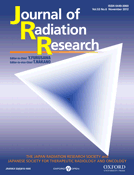
JOURNAL OF RADIATION RESEARCH
Connecting researchers to the latest in radiation science.JOURNAL OF RADIATION RESEARCH, published by Oxford University Press, is a prominent peer-reviewed journal focusing on the diverse fields of radiation science, including health, toxicology, and radiology. Since its inception in 1960, this open-access journal has provided a critical platform for the dissemination of high-quality research, making it accessible to a global audience of researchers, professionals, and students. With a consistent track record, the journal holds an impressive impact factor and is categorized in Q2 of Radiation studies and Q3 in Health and Toxicology as per the 2023 rankings, reflecting its influential role in shaping contemporary discourse in the field. The journal also boasts notable rankings within Scopus, further underscoring its importance in advancing knowledge and innovations related to radiation. Spanning from 1960 to 2024, the JOURNAL OF RADIATION RESEARCH remains at the forefront of scientific exploration and is essential reading for anyone committed to advancing the understanding of radiation and its effects.

Radiation Oncology Journal
Driving progress in cancer treatment with expert knowledge and innovation.Radiation Oncology Journal, published by the Korean Society of Therapeutic Radiology & Oncology, stands at the forefront of cancer treatment research and innovation within the dynamic fields of oncology and radiology. With a focus on disseminating groundbreaking findings and advancements from 2012 to 2024, this journal aims to foster collaboration among researchers, clinicians, and educators dedicated to improving therapeutic techniques and patient outcomes in the context of radiation therapy. Recognized with a prestigious Q2 ranking in both the Oncology and Radiology, Nuclear Medicine and Imaging categories, it ranks 140th out of 333 in its Scopus category for Medicine Radiology and boasts a 58th percentile placement. While operating on a non-open access basis, the journal remains committed to providing valuable insights and updates to professionals in the field from its base in South Korea. As the landscape of cancer treatment evolves, the Radiation Oncology Journal continues to play a vital role in shaping research trends and enhancing the understanding of radiotherapy's role in comprehensive cancer care.
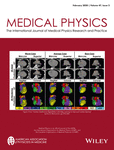
MEDICAL PHYSICS
Championing Excellence in Medical Physics ScholarshipMEDICAL PHYSICS, published by WILEY, stands as a leading journal in the fields of biophysics, medicine, and radiology, boasting an impressive impact factor and classified within the prestigious Q1 category across multiple relevant domains. With its ISSN 0094-2405 and E-ISSN 2473-4209, the journal has been a vital resource since its inception in 1974, leading the discourse well into 2024. Hailing from the United States, MEDICAL PHYSICS serves a diverse academic audience, comprising researchers, clinicians, and students eager to engage with the latest advancements and methodologies. The journal’s authoritative presence is underscored by its Scopus rankings, placing it among the top percentile in both Medicine and Biophysics, marking it as an essential scholarly platform for innovative research and critical reviews. While not currently an Open Access journal, its commitment to curating high-quality articles ensures that readers can access groundbreaking insights into medical imaging, treatment protocols, and the theoretical underpinnings of medical physics. Explore the intersection of technology and healthcare through the esteemed pages of MEDICAL PHYSICS.

Journal of Radiosurgery and SBRT
Bridging Science and Practice in SBRTJournal of Radiosurgery and SBRT is a dedicated platform for advancing the field of radiosurgery and stereotactic body radiation therapy (SBRT), published by OLD CITY PUBLISHING INC. With its ISSN 2156-4639 and E-ISSN 2156-4647, this journal serves researchers and practitioners keen on the latest findings and methodologies in the domains of radiological technology and surgical oncology. Operating from Spain, the journal has established itself within notable quartiles, ranking Q3 in 2023 across categories including Radiological and Ultrasound Technology, Radiology, Nuclear Medicine and Imaging, and Surgery. The journal is indexed in Scopus, with rankings that place it at #311 in Medicine Surgery and #232 in Medicine Radiology categories, reflecting its significance in the academic community. Although it does not currently offer an open-access model, the Journal of Radiosurgery and SBRT aims to foster innovation and collaboration, making it an essential resource for those involved in cutting-edge research and clinical practice in radiosurgery.

Radiation Oncology
Connecting global experts to enhance radiotherapy practices.Radiation Oncology is a premier scholarly journal published by BMC, dedicated to advancing the field of oncology through innovative research and comprehensive reviews since its inception in 2005. With its Open Access model, the journal ensures that the latest findings in radiotherapy and cancer treatment are accessible to a global audience, fostering collaboration and knowledge sharing among researchers, clinicians, and healthcare professionals. The journal has garnered an impressive reputation with prestigious rankings, achieving Q1 status in Radiology, Nuclear Medicine and Imaging and Q2 in Oncology as of 2023, reflecting its significant impact on the scientific community. In the Scopus rankings, it stands proud at Rank #61 in Radiology, Nuclear Medicine and Imaging, placing it in the top 81st percentile, and Rank #112 in Oncology at the 72nd percentile. With a converged publication plan extending through 2024, Radiation Oncology remains a vital resource for those dedicated to enhancing cancer treatment methodologies and outcomes.
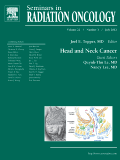
SEMINARS IN RADIATION ONCOLOGY
Transforming Cancer Care through Rigorous ScholarshipSEMINARS IN RADIATION ONCOLOGY is a premier journal published by W B SAUNDERS CO-ELSEVIER INC, dedicated to advancing the field of radiation oncology through high-quality research and comprehensive reviews. With an impressive impact factor and a notable HIndex, this journal holds a prominent place within the academic community, particularly illustrated by its Q2 ranking in both Cancer Research and Oncology, and a Q1 ranking in Radiology, Nuclear Medicine, and Imaging as of 2023. Since its inception in 1991, the journal has served as a vital resource for researchers, clinicians, and healthcare professionals, facilitating the exchange of innovative ideas and practices that shape the future of cancer treatment. While the journal is not open access, it offers essential insights into the latest advancements in the field, catering to a diverse audience eager to expand their knowledge and improve patient outcomes in the realm of radiation therapy.
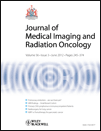
Journal of Medical Imaging and Radiation Oncology
Transforming Oncology Through Cutting-Edge Imaging ResearchJournal of Medical Imaging and Radiation Oncology, published by WILEY, is a pivotal resource in the fields of oncology and medical imaging. With an impact factor reflective of its commitment to advancing research, the journal has maintained a robust reputation since its inception in 2008 and continues to thrive through 2024. It is indexed with an insightful ranking, with a Q2 classification in Radiology, Nuclear Medicine and Imaging, affirming its importance in these disciplines. This journal not only serves as an open access platform, allowing extensive reach and accessibility, but also fosters a scholarly community dedicated to the innovation of imaging techniques and radiation oncology practices. As a key player in disseminating crucial findings and advancements, it appeals to researchers, clinicians, and students who aim to contribute to the evolving landscape of medical imaging and cancer treatment methodologies. The journal is based in Australia, at 111 River St, Hoboken, NJ, and invites submissions that push the boundaries of current knowledge in this critical area of healthcare.

Advances in Radiation Oncology
Connecting Ideas, Advancing OncologyAdvances in Radiation Oncology, published by Elsevier Inc, is a premier international journal dedicated to the field of oncology and radiology, focusing on the latest groundbreaking research and innovations in radiation therapy. Launched as an Open Access journal in 2016, it has since carved out a significant niche in the academic community, featuring contributions that span a diverse range of topics including clinical practices, technologies, and outcomes in radiation oncology. With an impressive Q2 rankingOncology and Radiology, Nuclear Medicine and Imaging categories for 2023, and positioned within the 65th and 55th percentiles of Scopus ranks, it serves as an essential resource for researchers, medical professionals, and students alike. The journal not only emphasizes the importance of disseminating knowledge widely through its open access model but also aims to foster collaboration and innovation in the evolving landscape of cancer treatment. For those looking to stay at the forefront of radiotherapy research and advancements, Advances in Radiation Oncology is an invaluable platform for scholarly communication.